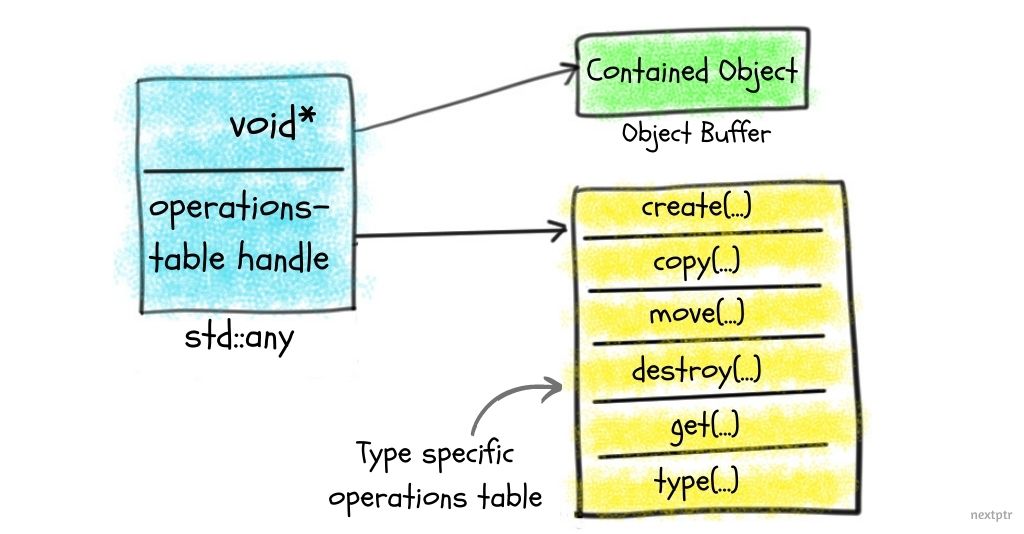(译)std::any和void*的对比
24 Nov 2020
|
|
翻译整理自这篇文章
std::any不是替代void*的产物,但是在某些场景下确实是更安全的替代品,并且 std::any也是构建在void*之上的
实际上就是记住类型信息的void* (type-aware void *)
struct any {
void* object;
type_info tinfo;
};
由于不是模版,不能携带类型信息,所以要有额外的绑定信息

而且 std::any还要做small object optimization, SOO (也叫SBO, small buffer optimization), 如果存个int/double指针只有两三个,不需要堆分配,直接SBO了
此外,std::any还支持移动语义,偷数据
std::any a = std::string("Hello");
//value cast creates a copy
std::cout << std::any_cast<std::string>(a) << "\n"; //Hello
//reference cast
std::any_cast<std::string&>(a)[0] = 'h'; //cast as reference and change
//value is changed to "hello" now
//cast as const reference and print
std::cout << std::any_cast<const std::string&>(a) << "\n"; //hello
// --- prints "Wrong Type!" below ---
try {
std::cout << std::any_cast<double>(a) << "\n";
}catch(const std::bad_any_cast&) {
std::cout << "Wrong Type!\n";
}
//Pointer cast example
// --- prints "hello" below ---
if(auto* ptr = std::any_cast<std::string>(&a)) {
std::cout << *ptr << "\n";
} else {
std::cout << "Wrong Type!\n";
}
//move example
auto str = std::any_cast<std::string&&>(std::move(a));
//std::string in 'a' is moved
std::cout << str << "\n"; //hello
//string in 'a' is moved but it is not destroyed
//therefore 'a' is not empty.
std::cout << std::boolalpha << a.has_value() << "\n"; //true
//but should print ""
std::cout << std::any_cast<std::string>(a) << "\n"; //should be ""
std::any的一个典型应用场景
假设我们要实现一个带TTL的cache, key是string,值可以是任意
class TTLCache {
public:
//Initializes with a given ttl (in seconds)
TTLCache(uint32_t ttl):ttlSeconds(ttl){}
//Adds an item to the cache along with the current timestamp
bool add(const std::string& key, const std::any& value);
//Gets a value from cache if exists
// - otherwise returns empty std::any
std::any get(const std::string& key);
//Erases an item for a given key if exists
void erase(const std::string& key);
// Fires periodically in a separate thread and erases the items
// - from cache that are older than the ttlSeconds
void onTimer();
//...more interfaces...
private:
//Values stored along with timestamp
struct Item {
time_t timestamp;
std::any value;
};
//Expire time (ttl) of items in seconds
uint32_t ttlSeconds;
//Items are stored against keys along with timestamp
std::unordered_map<std::string, Item> items;
};
暂时不考虑什么O1效率之类的问题
void *的一个典型应用场景
网络传输数据,user data,用void *表达任意二进制/字符串/协议数据
//Clients send requests to servers
struct Request {
/*..Request fields..*/
//User data can be set by clients
void* userData;
};
//When a response comes to the client, it has
// - same user data that was attached to the Request
struct Response {
/*..Response fields..*/
//User data copied from Request
void* userData;
};
void sendRequest() {
Request req;
//Prepare request
req.userData = new std::string("state data"); //Attach user data
//Send request to server...
}
//Process response
void processResponse(Response& res) {
auto state = (std::string*)(res.userData); //cast not type-safe
//Process response using state data....
delete state; // delete state
}
发送数据new出来,处理数据知道数据是new的,处理后删掉
这种场景下,不类型安全且需要堆分配,没有SBO优化
可以用std::any轻松替换
//--- Suppose userData is std::any ---
void sendRequest() {
Request req;
req.userData = std::string("state data"); //attach user data
//send request to server
}
void processResponse(Response& res) {
auto& state = std::any_cast<std::string&>(res.userData); //throws if type does not match
//Process response using state data....
//No need to explicitly delete the user data.
}
优化也用上了,也不用担心类型的问题,也不用担心释放的问题,一箭三雕
这种user data之前有一种解决方案,std::shared_ptr<void> 这里有文章介绍, 简单说,就是利用shared_ptr构造的时候会记录类型,保证析构
译者注: 之前比较无知还反驳过同事不能这么用
std::shared_ptr<void> vps = std::make_shared<std::string>(); //OK
vps.reset(); //Appropriate destructor is called
auto sps = std::static_pointer_cast<std::string>(vps); //OK with typecast
//sps is std::shared_ptr<std::string>
针对user data场景,直接把userdata类型换成shared_ptr<void>就行了
缺点在于用不上SBO优化,也有多余的记录开销,也没有移动内部对象的能力, 如果用不上c++17,临时用用也可以,最佳方案还是这个std::any
